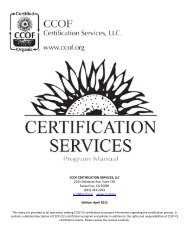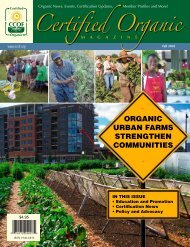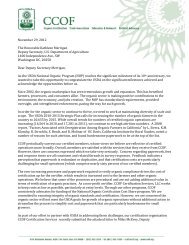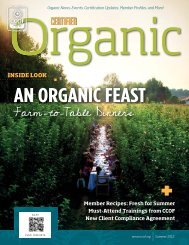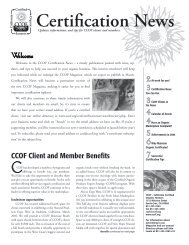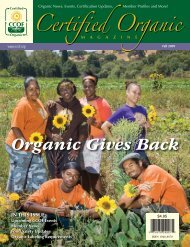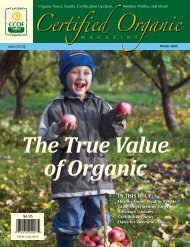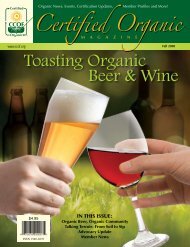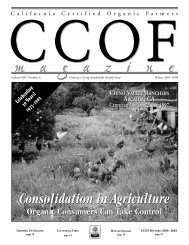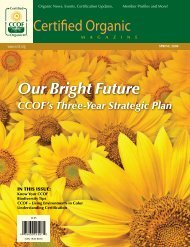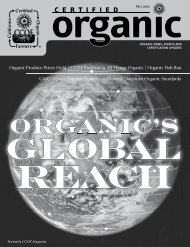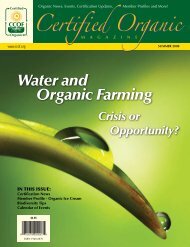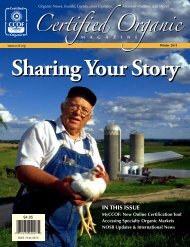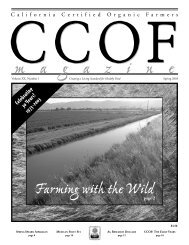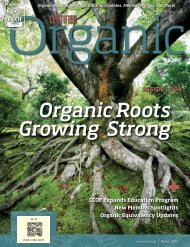Herstory: Women in Organic Agriculture - CCOF
Herstory: Women in Organic Agriculture - CCOF
Herstory: Women in Organic Agriculture - CCOF
Create successful ePaper yourself
Turn your PDF publications into a flip-book with our unique Google optimized e-Paper software.
FEATURE<br />
ARTICLE<br />
CELEBRATING THE<br />
HISTORY OF WOMEN IN<br />
ORGANIC AGRICULTURE<br />
By Sarah Jo Neubauer<br />
RU RIVERS HAS BEEN A FULLtime<br />
partner of Full Belly Farm<br />
s<strong>in</strong>ce its birth 18 years ago. As Dru<br />
expla<strong>in</strong>s, she feels be<strong>in</strong>g a woman<br />
farmer is more accepted now than it was<br />
at the found<strong>in</strong>g of Full Belly Farm <strong>in</strong> 1983.<br />
It’s too easy for people to perceive her as<br />
a mother and a housewife <strong>in</strong>stead of as<br />
a farmer. It takes perseverance to be<br />
recognized as a full-time farmer.<br />
Dru recalls be<strong>in</strong>g asked by a visitor<br />
to the farm, “‘Where’s the real farmer?’<br />
This is one example of some of the bizarre<br />
comments I have heard over the years. It’s<br />
still a battle.”<br />
Without recogniz<strong>in</strong>g women’s contribution<br />
to the history of organic agriculture,<br />
the history would be <strong>in</strong>complete. <strong>Women</strong><br />
have been fuel<strong>in</strong>g the organic generator<br />
for decades through farm<strong>in</strong>g, education,<br />
market<strong>in</strong>g, organizational development,<br />
policymak<strong>in</strong>g, science, research and more.<br />
This is a historical and cultural perspective<br />
that comb<strong>in</strong>es many women’s<br />
experiences, <strong>in</strong>sights, reflections, and<br />
passions beh<strong>in</strong>d why<br />
they have chosen a<br />
livelihood <strong>in</strong> organic<br />
agriculture. It would<br />
be impossible to<br />
<strong>in</strong>troduce all of the<br />
ways <strong>in</strong> which women<br />
have impacted and<br />
developed <strong>CCOF</strong> and<br />
the organic movement,<br />
but we hope to<br />
illustrate several here.<br />
Zea Sonnabend, Farm Inspector<br />
RISKY BUSINESS<br />
There are risks that women have taken to<br />
help California’s organic agriculture<br />
progress, because women have not always<br />
been as accepted <strong>in</strong> agriculture as they are<br />
today. But with determ<strong>in</strong>ation, commitment,<br />
and a lot of hard work, women<br />
cont<strong>in</strong>ue to break down traditional maledom<strong>in</strong>ated<br />
sectors of the labor force, like<br />
agriculture. <strong>Women</strong> have strategically<br />
refra<strong>in</strong>ed from be<strong>in</strong>g seen as the housewife,<br />
or the farmer’s wife, because women are<br />
also farmers.<br />
Dru Rivers of Full Belly Farm<br />
Photo courtesy of J. Redmond<br />
Dru is clearly adamant about driv<strong>in</strong>g the<br />
tractor and not just do<strong>in</strong>g sales calls from<br />
the farm’s office. “Stepp<strong>in</strong>g out of traditional<br />
roles is not always easy. It’s try<strong>in</strong>g<br />
on everybody,” adds Dru.<br />
Zea Sonnabend is a farm <strong>in</strong>spector,<br />
among many th<strong>in</strong>gs, and has been work<strong>in</strong>g<br />
with <strong>CCOF</strong> for 20 years. She recalls times<br />
when men would w<strong>in</strong>ce when they saw a<br />
woman step out of the car to do a farm<br />
<strong>in</strong>spection.<br />
Times were different back then. It wasn’t<br />
like now, where there are actual jobs <strong>in</strong><br />
organic agriculture. And, Zea agrees with<br />
Dru, she feels that women are more<br />
accepted <strong>in</strong> ma<strong>in</strong>stream agriculture today<br />
than ever before.<br />
Dru and Zea expressed<br />
their experiences with the<br />
recruitment of women <strong>in</strong>to<br />
agriculture. Dru recalls discuss<strong>in</strong>g<br />
how to get more<br />
women <strong>in</strong>volved <strong>in</strong> farm<strong>in</strong>g<br />
at CAFF (Community<br />
Alliance with Family Farmers)<br />
meet<strong>in</strong>gs. She advocated<br />
that it was not about<br />
gett<strong>in</strong>g more women farmers<br />
on board, but rather<br />
look<strong>in</strong>g at the big picture<br />
of traditional gender roles and how they<br />
have been constructed.<br />
Zea remembers the pressure women<br />
experienced to attend graduate school <strong>in</strong><br />
the 1970’s, and specifically to get <strong>in</strong>volved<br />
<strong>in</strong> agriculture. While she worked towards<br />
her master’s degree <strong>in</strong> Plant Breed<strong>in</strong>g at<br />
Cornell University, she recalls, “I was often<br />
<strong>in</strong>troduced as the token woman of the agriculture<br />
department.”<br />
She knew she had to ga<strong>in</strong> credibility for<br />
herself and for women <strong>in</strong> agribus<strong>in</strong>ess overall<br />
by be<strong>in</strong>g committed to organic agriculture<br />
as a career.<br />
As for Janet Brians of Brians Ranch, she<br />
was never made to feel <strong>in</strong>secure as a farmer.<br />
When asked what struggles she endured<br />
as one of the pioneer<strong>in</strong>g women <strong>in</strong> organic<br />
agriculture thirty years ago, Janet replied, “I<br />
was so happy and passionate about my work<br />
as a farmer and what I was do<strong>in</strong>g that I did<br />
not care what others might th<strong>in</strong>k about me.”<br />
Further, she was used to see<strong>in</strong>g women<br />
<strong>in</strong> agricultural positions of responsibility.<br />
As a girl, Janet grew up with the role model<br />
of an aunt who farmed <strong>in</strong> Ill<strong>in</strong>ois. Also, she<br />
knew women who had been farm<strong>in</strong>g for<br />
decades <strong>in</strong> San Benito County. “Where I<br />
come from, women were never really seen<br />
as peculiar by the family or the farm<strong>in</strong>g<br />
community when they were driv<strong>in</strong>g a tractor,<br />
prun<strong>in</strong>g, or do<strong>in</strong>g other farm work.”<br />
WHY FARMING?<br />
For some women, grow<strong>in</strong>g up on a farm<br />
was their <strong>in</strong>troduction to agriculture. Others<br />
sought a career <strong>in</strong> agriculture by earn<strong>in</strong>g a<br />
degree <strong>in</strong> entomology or agronomy. While<br />
an activist <strong>in</strong> college with the United Farm<br />
Workers Union (UFW), Kate Burroughs<br />
decided to work with organic farm<strong>in</strong>g to<br />
help others. She was extremely moved by<br />
stories of farm workers be<strong>in</strong>g poisoned, and<br />
she cared about reduc<strong>in</strong>g the use of toxic<br />
pesticides and the poison<strong>in</strong>g of people.<br />
Kate worked for the California<br />
Department of Food and <strong>Agriculture</strong><br />
(CDFA) for three years on a control and<br />
eradication project, which was a strange place<br />
for someone with a degree <strong>in</strong> Biological<br />
Control. As she worked to get the<br />
department to stop us<strong>in</strong>g dangerous<br />
chemicals, she became familiar with the<br />
political economics of the “use it or lose it<br />
budget mentality” of the CDFA. As a woman<br />
The Newsletter of <strong>CCOF</strong>



